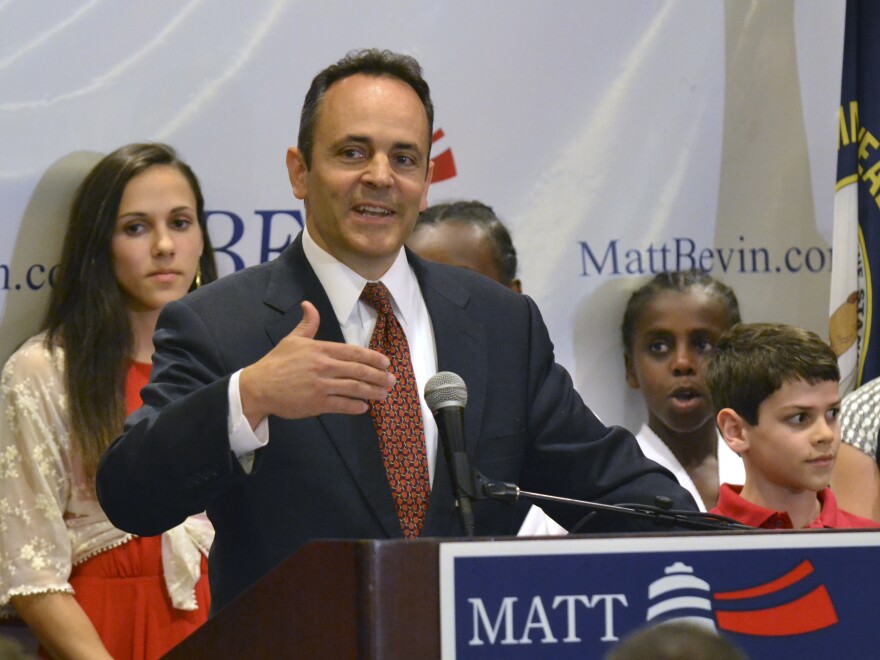More than 500,000 people have gotten health insurance in Kentucky through the state's health care exchange, Kynect, and through expanded Medicaid. Kentucky has seen the second-steepest drop in uninsured of any state.
Supporters of the health care law point to it as one of the success stories, but the man who very well could become the state's next governor is vowing to "dismantle" Kynect and cancel the Medicaid expansion.

"We will have a very spirited discussion as it relates to health care in our state. Trust me on that," vowed Republican Matt Bevin, the surprising apparent winner of the contentious GOP gubernatorial primary. The Tea Party-backed Bevin finished just 83 votes ahead of James Comer, the state's agriculture commissioner, out of more than 200,000 votes.
(There will be a recanvass next week, matching numbers recorded at polling locations to totals sent to the state, but with votes counted electronically in the state, it is unlikely much will change in the vote total.)
"Obamacare's been very good to the state," said Al Cross, director of the Institute for Rural Journalism and Community Issues at the University of Kentucky.
But President Obama is very unpopular in the state and anything associated with him is, too. Kentuckians and Bevin are stressing the "first three syllables instead of the last one" in Obamacare, Cross said.
It is the latest example of the problems Obama's signature legislation has faced at the state level, where most governors and legislatures are in Republican hands. The Affordable Care Act, often called "Obamacare," can be viewed very differently based on the name.
In 2013, Hart Research and Public Opinion Strategies, the bipartisan pollsters who conduct the NBC News/Wall Street Journal poll, tested that in 2013 for CNBC. The poll asked separately about feelings toward "Obamacare" and the "Affordable Care Act." There was almost a 10-point difference in how much more negatively people felt toward "Obamacare," and almost three times as many did not know the "Affordable Care Act."
It was similar when the question was asked specifically in Kentucky about feelings toward "Kynect" and "the new health care law." An NBC News/Marist poll in May 2014 found by a 29 percent to 22 percent margin that Kentuckians had a favorable opinion of their state health care exchange. But 57 percent had an unfavorable view of "Obamacare," while just 1 in 3 had a positive one.
In Kentucky, the governor has the power to unilaterally create or disband programs like Kynect, Cross said. Incumbent Democratic Gov. Steve Beshear chose to both set up a state exchange and expand Medicare. But he is term-limited.
Bevin, a venture capitalist who lost badly in a Senate primary last year to Mitch McConnell, would face off with Democrat Jack Conway. Conway, the state attorney general, starts as a slight favorite, but Kentucky is a conservative state, and Conway struggled in his 2010 Senate bid against Republican Rand Paul.
Bevin made getting rid of Kynect and the Medicaid expansion central to his campaign. He is also vowing to implement right-to-work laws and shrink government, in part, through attrition of public sector workers.
"I think it, too, is destined to crumble under the weight of its own instability," Bevin said of Kynect when he announced his long-shot bid for governor.
Bevin wound up breaking through in the primary, in large measure, by pitting the two front-runners against each other. He did it with this memorable ad, depicting Comer and Hal Heiner, a former Louisville city councilman, as children at a backyard table throwing food at each other:
"Hal Heiner and James Comer are acting like children, throwing insults and attacking each other," an announcer says as pasta splatters across the lens. "Kentucky can do much better." The ad pivots, labeling Bevin as "grown-up leadership for Kentucky."
But now it will be Bevin's policies that come under sharper scrutiny. He argues the state cannot afford the Medicaid expansion, which was the biggest reason for the drop in the uninsured. Federal funds currently pay for it, but that money will eventually go away.
"The fact that we have 1 out of 4 people in this state on Medicaid is unsustainable; it's unaffordable," Bevin said during the campaign, "and we need to create jobs in this state, not more government programs to cover people."
But Medicaid expansion is different than Kynect, which has been held up as one of the best-functioning state exchanges in the country.
"He won't get away with it," Cross maintained of Bevin's promise to get rid of Kynect. "He'll have to get serious about it at some point and stop conflating Kynect and the Medicaid expansion."
Copyright 2023 NPR. To see more, visit https://www.npr.org.



